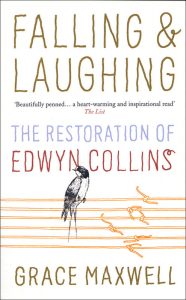 At the time of his stroke Edwyn Collins was a singer-songwriter with an international reputation, a founder of Glaswegian band Orange Juice, and with the hit ‘A Girl like You’ to his name. In February 2005 he had two haemorrhagic strokes, followed by neurosurgery, a period of hospital isolation due to MRSA, and a prolonged time of hospital rehabilitation. Eventually he returned home in August in time for his 46th birthday. The strokes left him confused, aphasic, unable to read or sing, and with severe weakness and loss of sensation in the right side. Over the next eighteen months of hard work Edwyn recovered to the extent of returning to the stage to sing and write songs. The story of the disaster and his recovery has been told in several ways. His wife Grace Maxwell has written a book, Falling and Laughing. But there are also two documentaries, one from BBC Scotland in 2007, and one for FilmFour in 2014. Each of these have their strengths, and complement the others.
At the time of his stroke Edwyn Collins was a singer-songwriter with an international reputation, a founder of Glaswegian band Orange Juice, and with the hit ‘A Girl like You’ to his name. In February 2005 he had two haemorrhagic strokes, followed by neurosurgery, a period of hospital isolation due to MRSA, and a prolonged time of hospital rehabilitation. Eventually he returned home in August in time for his 46th birthday. The strokes left him confused, aphasic, unable to read or sing, and with severe weakness and loss of sensation in the right side. Over the next eighteen months of hard work Edwyn recovered to the extent of returning to the stage to sing and write songs. The story of the disaster and his recovery has been told in several ways. His wife Grace Maxwell has written a book, Falling and Laughing. But there are also two documentaries, one from BBC Scotland in 2007, and one for FilmFour in 2014. Each of these have their strengths, and complement the others.
Falling and Laughing is very definitely Grace’s take on Edwyn’s stroke and his recovery. It gives her book a clarity of perspective which is sometimes lacking from the documentaries (although these have the freedom to observe from many vantage points, using the camera to observe, and clips from interviews with Edwyn and Grace, but also their son Will, the band members, Ellen the physio, Trudi and Sally the speech therapists). The book also provides background detail which the films lack, detail which reveals the effort behind the achievements. Edwyn’s reborn skills in speech and singing, his left-handed drawing, and even his walking are caught on the films, but Grace describes the hours, days, weeks of practice that were required to get there. For example, the shots in the 2007 documentary of Edwyn and Grace tackling the irregular steep stone Whalligoe Steps near their house in Scotland give the impression that he managed all of them. But in the book Grace tells of a windy half-way-down-and-back attempt, which was a triumph in itself at that stage of recovery.
The book is peppered with Edwyn Collins’ comments: funny, telegrammatic at times, and often ambiguous. Each chapter is headed by one of Edwyn’s impressive (left-handed) bird drawings. And Grace also quotes letters and e-mails from relatives, friends, therapists and fans. It is a truly rich tapestry, despite the absence of the moving image and of Edwyn’s soundtrack.
Grace is an engaging and self-deprecating narrator, who can communicate the bewilderment, the lows, and her anger at lack of care, but also the sense of Edwyn’s underlying positivity about himself, even during the months of aphasia. She is an acute listener, aware of Edwyn’s hilarious but idiosyncratic and intermittent vocabulary – quotes in the hospital days like ‘Life is an aphrodisiac’ spice up the diary entries. She is a vibrant presence, who, although she can quote the advice for communicating with aphasics, knows that she follows none of them – talking non-stop in flowery language, anticipating Edwyn’s intentions and inviting lots of company. I am sure she is a wonderfully lively companion.
She also tells the story of acting as Edwyn’s advocate in the dark days – pestering for the antibiotics that have not been given during his MRSA isolation, fighting to get the right wheelchair, the appropriate rehabilitation, sorting the gadgets for home. She documents the battles that need to be fought to obtain rehabilitation for vulnerable people who have been neurologically damaged – with a few home truths about the good and bad members of the care and rehab teams.
Yet again, echoing the testimony of many post-stroke narratives, we hear evidence of continuing improvement, long after a stroke has struck. For someone like Edwyn, determined to improve and express himself, and willing to take small steps and practise endlessly, “the possibilities are endless”.
Grace Maxwell (2009) Falling and Laughing: The Restoration of Edwyn Collins, London, Ebury Press
Edwyn Collins, Home Again (2007) Documentary, BBC Scotland, available at:
https://learningonscreen.ac.uk/ondemand/index.php/prog/0079759F?bcast=29357682
The Possibilities are Endless (2014) Documentary, Dir. James Hall
Shown Tuesday, 15 Dec 2015, 23:25 105 mins FilmFour, available at:
https://learningonscreen.ac.uk/ondemand/index.php/prog/0B997C14
Or via imdb https://www.imdb.com/title/tt3512066/